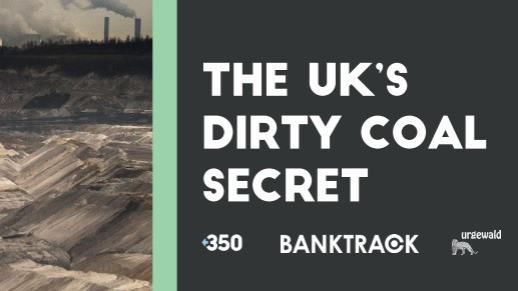Big four UK banks providing billions for coal power expansion, urged to ‘clean up their acts’ for Glasgow COP
Jacey Bingler, Communications Manager, urgewald
jacey@urgewald.org
Melanie Mattauch, melanie@350.org

Jacey Bingler, Communications Manager, urgewald
jacey@urgewald.org
Melanie Mattauch, melanie@350.org
A new report, 'The UK's dirty coal secret', reveals that one year out from the UK’s hosting of the United Nations Climate Change Conference (COP 26) in Glasgow, Barclays, HSBC, RBS and Standard Chartered have collectively supported the world’s top coal power expansion companies with $26.2 billion in financing during the period January 2017 to September 2019.
The NGOs publishing the report, BankTrack, urgewald and 350.org, have identified that this financing – project finance, corporate lending and underwriting – by the big four UK banks has gone to 48 companies around the world which currently have plans to construct 163 gigawatts (GW) of new coal plant capacity.
By supporting these companies, the UK’s big four banks are facilitating a potential increase to the global coal plant fleet capacity of more than 16 times the UK coal fleet’s current operational capacity, according to the report which is based on available information from financial databases. 1
While the UK continues to wean itself off coal with a 2025 domestic phase-out target in place, Barclays, HSBC, RBS and Standard Chartered still have only limited policy restrictions to curb their coal power financing globally.
As the report describes, UK banks are trailing behind more than ten of their European competitors which have begun to respond to the climate emergency by introducing coal finance restrictions which do a lot more than merely stopping direct finance for coal plant projects.
The UK banks’ policy lag is resulting in largely unfettered financing for coal power expansion companies, particularly for Asian companies to whom $16.7 billion of the UK top four financing has gone in the research period.
Tonny Nowshin, Diaspora Organiser at 350.org, said:
“It's a real double standard that the UK is phasing out coal at home, yet UK banks continue to finance new coal projects in Bangladesh, Vietnam and in other countries where climate change is already having its worst impacts. Fossil fuel financiers have to stop bankrolling the destruction of our climate, the natural world and people's livelihoods now.”
The new research has found that, since the beginning of 2017, financial support from the top UK banks to coal expansion companies breaks down as:
-
Barclays: $7.46 billion
-
HSBC: $7.92 billion
-
RBS: $2.28 billion
-
Standard Chartered: $8.56 billion
This financial support from the UK’s big four banks has gone to some of the most aggressive coal power companies in terms of their expansion plans and coal-based business focus. Among the 48 beneficiary companies are National Thermal Power Corporation of India, State Power Investment Corporation of China, PLN Persero of Indonesia, Adani of India and Fortum of Finland.
Katrin Ganswindt of urgewald said:
“The coal policy coverage of the top UK banks is shockingly weak, so it’s no surprise that their financing of some of the world’s most climate and health-damaging companies is consistently strong. UK banks should use the remaining 12 month until Glasgow COP wisely: Barclays, HSBC, RBS and Standard Chartered should clean up their acts and stop financing coal companies before it is too late for the climate and all of us.”
Greig Aitken of BankTrack said:
“Despite the threat of stranded assets and climate breakdown, UK banks are not doing enough to make the necessary exit from coal. Helping to drive climate disaster globally and impose severe pollution on millions of people in Asia particularly is appalling, when so many renewable energy projects in the region need financial support. The UK public and many others around the world will be making sure these banks come to their senses in the next 12 months before Glasgow.”
Notes for editors:
1. The financial data used in this report was provided from research conducted by Profundo using the Bloomberg and Refinitiv databases, as well as company reporting. For additional project finance deals, the research also used IJGlobal.
